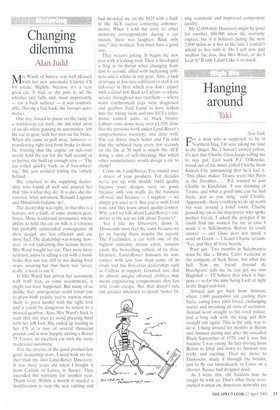Changing dilemma
Alan Judd
Mrs Ward, of Surrey, was well pleased with her new automatic Citroen CS V6 estate. Rightly, because it's a very good car. It had, as she puts it, all the whistles and bells and, most importantly — for a back sufferer — it was comfortable. Having a bad back, she favours automatics.
One day, forced to pause on the ramp in a multistorey car park, she did what most of us do when pausing in automatics: left the car in gear, with her foot on the brake. When she came to pull away, however — transferring right foot from brake to throttle, trusting that the engine on tick-over would hold the car for the half second or so before she built up enough revs — The car rolled quickly back, as if free-wheeling: She just avoided hitting the vehicle behind.
She returned to the supplying dealership, who found all well and assured her that 'this is what they do'. It is also, she discovered, what automatic Renault Lagunas and Mitsubishi Galants 'do'.
The dealership was right, in that this is a feature, not a fault, of some modern gearboxes. More traditional automatics, whose ability to hold the car on hills is a virtuous but probably unintended consequence of their design, are less efficient and use more fuel. The dealership was wrong, however, in not explaining this feature before Mrs Ward bought her car. They were more seriously amiss in selling a car with a handbrake that was too stiff to use during brief stops, assuring her that there was 'never, really, a need to use it', If Mrs Ward had driven her automatic with both feet, as some recommend, it might not have happened. But many of us dislike that: emergencies could tempt you to press both pedals; you're anyway more likely to press harder with the right foot and it could he dangerous to return to a manual gearbox. Also, Mrs Ward's back is such that she tries to avoid pressing hard with her left foot. She ended up trading in her CS at a loss of several thousand pounds and is now happily driving a Rover 75 Tourer, an excellent car with the more traditional automatic.
For the reverse of the good product/less good dealership story. I need look no further than my own Land-Rover Discovery. It was three years old when I bought it from Caffyns of Lewes, in Sussex. They extended the warranty for another year. Thank God. Within a month it needed a modification to stop the seat rattling and had stranded me on the M25 with a fault in the ACE (active cornering enhancement). When I told the story to other motoring correspondents during a car launch, there was laughter. Back only once? they mocked. You most have a good one.
They weren't joking. It began the new year with a leaking roof. Then it developed a frog in its throat when changing from first to second, allied with increasing stiffness and a whine in top gear. Also, a lack of torque at low revs sufficient to stall it on tick-over in first, which you don't expect with a diesel 4x4. Back to Caffyns — whose service throughout was excellent — where worn synchromesh cogs were diagnosed and gearbox fluid found to have leaked into the wiring loom and two ECUs (electronic control units, or black boxes). Labour costs alone were over £1,550, done like the previous work under Land-Rover's comprehensive warranty, and done well. The car drives much better and I'm told that the subdued burp every few seconds on the flat at 30 mph is simply the ACE doing a spot of self-checking. But which other manufacturer would design a car to clunk?
Come on, Land-Rover, I've owned over a dozen of your products. For decades we've put up with shoddy build quality because your designs were so good, because only you really do the business off-road and because — I suppose — we simply got used to it. But you're with Ford now, and they know about quality control. Why can't we talk about Land-Rover's reliability in the way we talk about Toyota's?
Yet I like my Discovery, damn it. Thousands must feel the same because we go on buying them despite the record. The Freelander, a car with one of the highest warranty return rates, remains easily the bestselling vehicle of its class. Granted, Land-Rover honours its warranties with less fuss than some of its rivals and has first-class dealerships such as Caffyns in support. Granted. too, that its almost unique off-road abilities may mean engineering compromises that less able rivals escape. But that doesn't rule out greater attention to detail, better fit
ting standards and improved component quality.
My 42,000-mile Discovery might be good for another 100,000 when the warranty expires, but if it behaves during the next 5,000 miles as it has in the last, I couldn't afford to live with it. Do I sell now and swallow the loss, like Mrs Ward, or do I keep it? If only I didn't like it so much.


































































 Previous page
Previous page